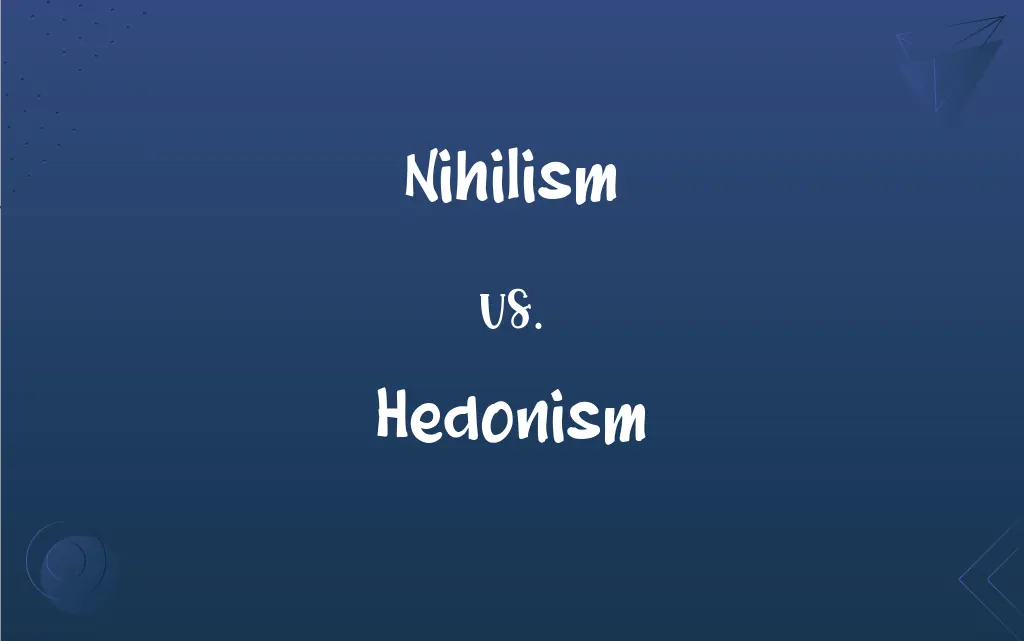Nihilism vs. Hedonism: What's the Difference?
By Janet White & Aimie Carlson || Updated on May 20, 2024
Nihilism rejects inherent meaning or value in life, while hedonism prioritizes the pursuit of pleasure and happiness as the highest goal.

Key Differences
Nihilism is a philosophical viewpoint that suggests life lacks inherent meaning, purpose, or value. Nihilists often believe that traditional beliefs, moral principles, and societal structures are unfounded, leading to a sense of existential despair or liberation from societal norms. Hedonism, in contrast, is a philosophy that identifies pleasure and happiness as the highest and most important goals in life. Hedonists seek to maximize their enjoyment and minimize pain, often valuing sensory experiences, emotional satisfaction, and personal well-being above other pursuits.
While nihilism can lead to a sense of disconnection or apathy due to its rejection of inherent meaning, hedonism encourages active engagement in life's pleasures and seeks to find fulfillment through positive experiences. Nihilism may view the quest for pleasure as ultimately meaningless, whereas hedonism sees it as the primary purpose of life.
Nihilism often questions the basis of morality and truth, suggesting that these concepts are human constructs without objective foundation. In contrast, hedonism usually embraces a more pragmatic approach to morality, advocating for actions that increase overall happiness and reduce suffering.
In literature and culture, nihilism is frequently associated with themes of existential angst and the absurd, as seen in works by philosophers like Friedrich Nietzsche and writers like Albert Camus. Hedonism, however, is more often linked to themes of indulgence and the celebration of life’s pleasures, with roots in ancient Greek philosophy, particularly the teachings of Epicurus.
Nihilism and hedonism offer contrasting perspectives on life: nihilism emphasizes the absence of inherent meaning, while hedonism focuses on the pursuit of pleasure as a meaningful goal.
ADVERTISEMENT
Comparison Chart
Primary Belief
Life lacks inherent meaning or value
Pursuit of pleasure is the highest goal
Emotional Impact
Can lead to existential despair
Encourages enjoyment and fulfillment
View on Morality
Morality is a human construct
Morality is based on maximizing happiness
Cultural Themes
Existential angst, the absurd
Indulgence, celebration of pleasures
Philosophical Roots
Associated with Nietzsche, Camus
Rooted in Greek philosophy, Epicurus
ADVERTISEMENT
Nihilism and Hedonism Definitions
Nihilism
Belief that life is without objective meaning.
Nietzsche's writings often explore themes of nihilism.
Hedonism
The pursuit of pleasure as the primary ethical goal.
Epicurus' philosophy is a well-known form of ethical hedonism.
Nihilism
Belief that reality might not exist at all.
Metaphysical nihilism posits that the universe could be an illusion.
Hedonism
Humans are motivated by the desire for pleasure.
Psychological hedonism suggests that all actions are driven by pleasure-seeking.
Nihilism
Denies any objective basis for moral values.
Moral nihilism challenges the existence of absolute ethics.
Hedonism
Excessive pursuit of pleasure can lead to dissatisfaction.
The hedonistic paradox warns that too much indulgence can reduce overall happiness.
Nihilism
Claims that life lacks intrinsic purpose.
Existential nihilism can lead to a sense of freedom from societal norms.
Hedonism
Valuing sensory and artistic pleasures.
Aesthetic hedonism encourages the appreciation of beauty and art.
Nihilism
Denial of the possibility of knowledge.
Epistemological nihilism questions the validity of our understanding.
Hedonism
Promotes actions that maximize pleasure for the greatest number.
Hedonistic utilitarianism evaluates morality based on the balance of pleasure over pain.
Nihilism
(Philosophy) The doctrine that nothing actually exists or that existence or values are meaningless.
Hedonism
Pursuit of or devotion to pleasure, especially to the pleasures of the senses.
Nihilism
Relentless negativity or cynicism suggesting an absence of values or beliefs
Nihilism in postwar art.
Hedonism
(Philosophy) The ethical doctrine holding that only what is pleasant or has pleasant consequences is intrinsically good.
Nihilism
Political belief or action that advocates or commits violence or terrorism without discernible constructive goals.
Hedonism
(Psychology) The doctrine holding that behavior is motivated by the desire for pleasure and the avoidance of pain.
Nihilism
Also Nihilism A diffuse, revolutionary movement of mid-19th-century Russia that scorned authority and tradition and believed in reason, materialism, and radical change in society and government through terrorism and assassination.
Hedonism
The belief that pleasure or happiness is the highest good in life. Some hedonists, such as the Epicureans, have insisted that pleasure of the entire mind, not just pleasure of the senses, is the highest good.
Nihilism
(Psychiatry) A delusion, experienced in some mental disorders, that the world or one's mind, body, or self does not exist.
Hedonism
(countable) A general devotion to the pursuit of pleasure.
Nihilism
The view that all endeavours are devoid of objective meaning.
Existential nihilism
Hedonism
The doctrine of the Hedonic sect; the pursuit of pleasure as a matter of ethical principle.
Nihilism
The rejection of, or opposition to, religious beliefs, (inherent or objective) moral principles, legal rules, etc., often due to the view that life is meaningless (sense 1).
Moral nihilism
Hedonism
The ethical theory which finds the explanation and authority of duty in its tendency to give pleasure.
Nihilism
The rejection of non-proven or non-rationalized assertions in the social and political spheres of society.
Hedonism
The pursuit of pleasure as a matter of ethical principle
Nihilism
A delusion that oneself or the world, or parts thereof, have ceased to exist.
Hedonism
An ethical system that evaluates the pursuit of pleasure as the highest good
Nihilism
Alternative case form of Nihilism
Nihilism
A doctrine grounded on the negation of one or more meaningful aspects of life; in particular, the view that nothing in the world actually exists.
Nihilism
(countable) Something that is regarded as meaningless.
Nihilism
Nothingness; nihility.
Nihilism
The doctrine that nothing can be known; scepticism as to all knowledge and all reality.
Nihilism
The theories and practices of the Nihilists.
Nihilism
A revolutionary doctrine that advocates destruction of the social system for its own sake
Nihilism
The delusion that things (or everything, including the self) do not exist; a sense that everything is unreal
Nihilism
Complete denial of all established authority and institutions
FAQs
Which ancient philosophy is linked to hedonism?
Hedonism is linked to the teachings of Epicurus, an ancient Greek philosopher.
Can nihilism and hedonism coexist?
It is challenging, as nihilism rejects inherent meaning, while hedonism finds meaning in pleasure.
Who is a notable philosopher associated with nihilism?
Friedrich Nietzsche is a prominent philosopher associated with nihilism.
What is the primary goal of ethical hedonism?
The primary goal of ethical hedonism is to achieve maximum pleasure.
What is nihilism?
Nihilism is the belief that life lacks inherent meaning, purpose, or value.
How does hedonism view pain?
Hedonism seeks to minimize pain and maximize pleasure.
What does hedonism advocate?
Hedonism advocates for the pursuit of pleasure and happiness as the highest goals in life.
What emotional impact does nihilism often have?
Nihilism can lead to existential despair or a sense of liberation from societal norms.
How does nihilism view societal structures?
Nihilism often views societal structures as unfounded and without objective justification.
What is aesthetic hedonism?
Aesthetic hedonism values sensory and artistic pleasures.
How does hedonism view moral actions?
Hedonism views moral actions as those that increase overall happiness and reduce suffering.
What is moral nihilism?
Moral nihilism is the belief that moral values are human constructs without objective basis.
Can nihilism affect one's view on morality?
Yes, nihilism often leads to questioning or rejecting traditional moral principles.
Is there a paradox associated with hedonism?
Yes, the hedonistic paradox suggests that excessive pursuit of pleasure can lead to dissatisfaction.
How does hedonism approach life’s pleasures?
Hedonism encourages active pursuit and enjoyment of life's pleasures.
What is existential nihilism?
Existential nihilism claims that life lacks intrinsic purpose or meaning.
What is psychological hedonism?
Psychological hedonism is the theory that humans are motivated by the desire for pleasure.
What themes are common in nihilistic literature?
Common themes include existential angst, the absurd, and the meaninglessness of life.
What is hedonistic utilitarianism?
Hedonistic utilitarianism promotes actions that maximize overall pleasure and minimize pain.
Can nihilism lead to a sense of freedom?
Yes, some nihilists find a sense of liberation in rejecting traditional norms and values.
About Author
Written by
Janet WhiteJanet White has been an esteemed writer and blogger for Difference Wiki. Holding a Master's degree in Science and Medical Journalism from the prestigious Boston University, she has consistently demonstrated her expertise and passion for her field. When she's not immersed in her work, Janet relishes her time exercising, delving into a good book, and cherishing moments with friends and family.
Co-written by
Aimie CarlsonAimie Carlson, holding a master's degree in English literature, is a fervent English language enthusiast. She lends her writing talents to Difference Wiki, a prominent website that specializes in comparisons, offering readers insightful analyses that both captivate and inform.































































